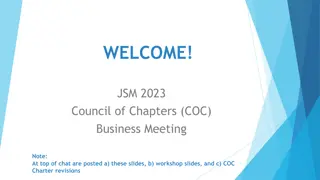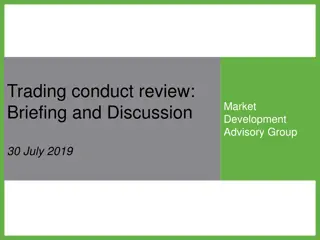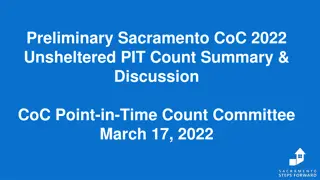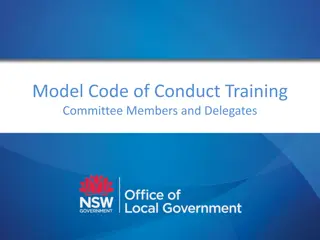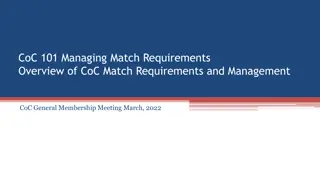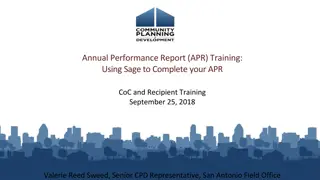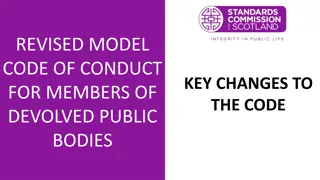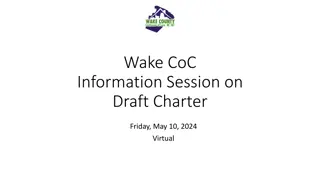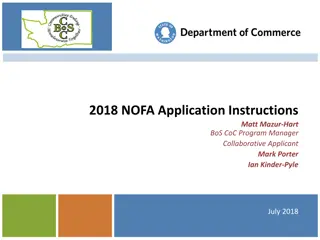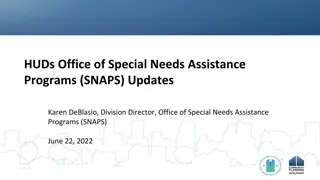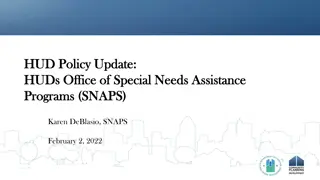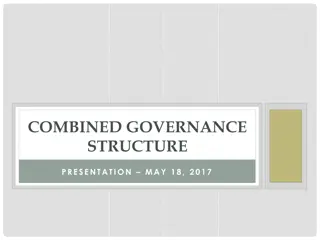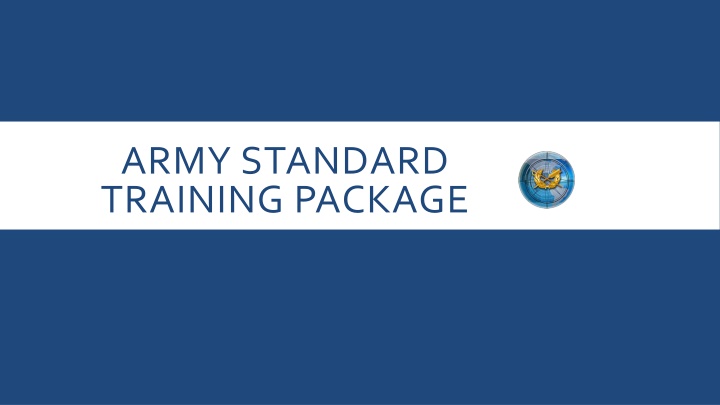
Standard Army Training Package and Code of Conduct Overview
Explore the comprehensive standard training package offered by the army, along with insights into the Code of Conduct as of July 2022. Learn about the history, significance, and applicability of the Code, emphasizing the principles of allegiance and resistance. Discover the evolution of the Code since 1955 and its relevance in various military contexts, ensuring the honorable treatment of all servicemembers. Dive into the essential guidelines and references for personnel recovery and education, highlighting the commitment to safeguarding national interests and upholding military virtues.
Download Presentation

Please find below an Image/Link to download the presentation.
The content on the website is provided AS IS for your information and personal use only. It may not be sold, licensed, or shared on other websites without obtaining consent from the author. If you encounter any issues during the download, it is possible that the publisher has removed the file from their server.
You are allowed to download the files provided on this website for personal or commercial use, subject to the condition that they are used lawfully. All files are the property of their respective owners.
The content on the website is provided AS IS for your information and personal use only. It may not be sold, licensed, or shared on other websites without obtaining consent from the author.
E N D
Presentation Transcript
ARMY STANDARD TRAINING PACKAGE
THE CODE OF CONDUCT Current as of 1 July 2022
INTRODUCTION Not just for aviators anymore. Not just for Soldiers. There are very few formal front lines. Captors may not be parties to the Geneva Conventions. Civilians accompanying the force are at risk. Media attention is intense and not just on American outlets. Current as of 1 July 2022
HISTORY OF THE CODE 1955 Executive Order 10631 issued to provide guidance to members of the Armed Forces in combat and while a POW or subject to hostile detention 1964 Published DoD Directive 1300.7 1977 ARTICLE V amended to include Bounce Back Policy 1988 Amended to become gender neutral Current as of 1 July 2022
THE CODE IS NOT: A punitive regulation or a general order, BUT Violations of certain Articles may also violate provisions of the UCMJ. EXAMPLE: Acts harmful to comrades (Code of Conduct, ARTICLE IV) may also violate the UCMJ (ARTICLE 104, Aiding the Enemy). Current as of 1 July 2022
REFERENCES Executive Order 10631, Aug 1955; Executive Order 12017, Nov 1977; Executive Order 12633, Mar 1988. DoD Instruction O-3002.05, Personnel Recovery (PR) Education and Training, 12 Apr 2016. Joint Publication 3-50, Personnel Recovery, 2 Oct 2015. Current as of 1 July 2022
ARTICLE I I am an American, fighting in the forces which guard my country and our way of life. I am prepared to give my life in their defense. Current as of 1 July 2022
ARTICLE I Applies to ALL Servicemembers AT ALL TIMES During Armed Conflict as well as during peacetime captivity Enables POWs to survive long and stressful periods of captivity and return to their country and families honorably and with pride Current as of 1 July 2022
ARTICLE II I will never surrender of my own free will. If in command, I will never surrender the members of my command while they still have the means to resist. Current as of 1 July 2022
ARTICLE II Every Servicemember has the duty to refuse voluntary surrender and to attempt to evade capture. BUT If capture is unavoidable and further fighting would lead to your death with no significant loss to the enemy, then capture may be acceptable. A Commander must not surrender command, even if the unit is cut-off, isolated, or surrounded, while the unit has the ability to resist, break out, or evade to rejoin friendly forces. Current as of 1 July 2022
ARTICLE III If I am captured, I will continue to resist by all means available. I will make every effort to escape and aid others to escape. I will accept neither parole nor special favors from the enemy. Current as of 1 July 2022
ARTICLE III POWs can expect to be exploited by their captors, but must resist all such efforts. POWs MUST NOT accept special favors, benefits or privileges not given to other POWs. The Geneva Convention for POWs (GC III) recognizes the right of a POW to attempt to escape. Although the Geneva Convention for POWs authorizes a POW to accept parole, U.S. POLICY FORBIDS IT. Current as of 1 July 2022
MEDICAL PERSONNEL AND CHAPLAINS RETAINED PERSONNEL performing medical and religious duties If allowed to perform duties, no duty to escape If treated as a POW, duty to escape Current as of 1 July 2022
ARTICLE IV If I become a prisoner of war, I will keep faith with my fellow prisoners. I will give no information or take part in any action which might be harmful to my comrades. If I am senior, I will take command. If not, I will obey the lawful orders of those appointed over me and will back them up in every way. Current as of 1 July 2022
ARTICLE IV Camp discipline, trust, and faith among POWs equals survival. Informing on or taking any other action detrimental to fellow POWs is expressly forbidden. Strong leadership is essential. POWs should organize in a military manner. Senior ranking person should assume command and designate the chain of command. Maintaining communications is critical. Current as of 1 July 2022
POW COMMAND Senior Officer, regardless of service, assumes command. Geneva Convention for POWs states that non-officer POWs will elect POW representatives, but U.S. Policy directs the senior NCO to assume command. Medical Officers can only command other medical personnel. Chaplains can never command. Current as of 1 July 2022
ARTICLE V When questioned, should I become a POW, I am required to give my name, rank, service number, and date of birth. I will evade answering any further questions to the utmost of my ability. I will make no oral or written statements disloyal to my country and its allies or harmful to their cause. Current as of 1 July 2022
ARTICLE V The Geneva Conventions for POWs codifies the information POWs must provide. Be careful filling out capture cards. Statements may be used as propaganda or to support accusations that captives are war criminals. Conviction as a war criminal can put combatant immunity in jeopardy. Current as of 1 July 2022
BOUNCE BACK POLICY Key phrase is utmost of my ability. If, under intense interrogation, unauthorized information is unwillingly or accidentally disclosed, the member should attempt to recover and resist with a fresh line of mental defense. The best way to keep faith is to provide as little information as possible. However, POWs should not feel like traitors if they are tortured beyond their ability to endure. Current as of 1 July 2022
ARTICLE VI I will never forget that I am an American fighting for freedom, responsible for my actions, and dedicated to the principles which made my country free. I will trust in my God and in the United States of America. Current as of 1 July 2022
ARTICLE VI REMINDS POWs THAT THEY WILL NOT BE FORGOTTEN. POW s can expect the United States to use every available means to secure their release and to take care of their families and their careers. POWs can be held accountable for their actions while in captivity. Current as of 1 July 2022
GUIDANCE FOR PEACETIME CAPTIVITY OR HOSTILE DETENTION U.S. Military personnel finding themselves isolated from U.S. control are required to do everything in their power to follow DoD policy. The DoD policy in this situation is to survive with honor. Current as of 1 July 2022
GUIDANCE FOR PEACETIME CAPTIVITY OR HOSTILE DETENTION For specific missions or in areas where U.S. Military personnel may have a high risk of peacetime detention or terrorist captivity, the services are obligated to provide training and detailed guidance. The U.S. shall make every good faith effort to obtain the earliest release. Personnel must take every reasonable step to avoid their exploitation or the exploitation of the Government of the United States. Current as of 1 July 2022
GUIDANCE FOR PEACETIME CAPTIVITY OR HOSTILE DETENTION U.S. personnel shall maintain their military bearing; discourteous, undisciplined behavior seldom serves long-term captive interests and may result in unnecessary punishment. Establish a Chain of Command. Current as of 1 July 2022
GUIDANCE FOR DETENTION BY GOVERNMENTS Once in the custody of a hostile government, detainees are subject to the laws of that government. Detainees should immediately and continually ask to see U.S. Embassy personnel or a representative of an allied or neutral government. U.S personnel who become lost or isolated in a hostile foreign country during peacetime shall not act as combatants during escape attempts. Since a state of armed conflict does not exist, there is no protection afforded under the Geneva Conventions. That country s laws apply. Current as of 1 July 2022
GUIDANCE FOR DETENTION BY GOVERNMENTS Detainees should provide Name, Rank, SSN, Date of Birth, and the innocent circumstances leading to their detention. Further discussions should be limited to and revolve around health and welfare matters, conditions of their fellow detainees, and going home. Detainees should avoid signing any document or making any statement. Escape attempts shall be made only after careful consideration of the risk of violence, chance of success, and detrimental effects on detainees remaining behind. Jailbreak is a crime in most countries. Current as of 1 July 2022
GUIDANCE FOR CAPTIVITY BY TERRORISTS If uncertain whether captors are genuine terrorists or surrogates of a government, assume that the captors are terrorists. Surviving some terrorist detentions may depend on captives conveying a personal dignity and apparent sincerity to the captors. Current as of 1 July 2022
GUIDANCE FOR CAPTIVITY BY TERRORISTS Make every effort to avoid embarrassing the U.S. and the host government. Hostages and kidnap victims who consider escape their only hope are authorized to make such attempts. Current as of 1 July 2022



